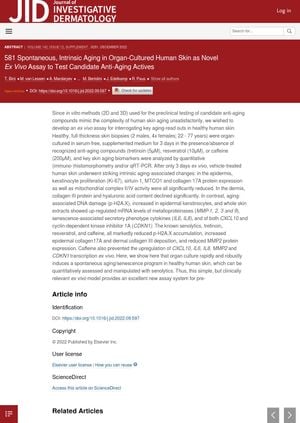Spontaneous Intrinsic Aging in Organ-Cultured Human Skin as a Novel Ex Vivo Assay to Test Anti-Aging Actives
November 2022
in “
Journal of Investigative Dermatology
”

TLDR The document concludes that a new method has been developed to test anti-aging substances on human skin, showing that these substances can reduce skin aging signs.
The document presents a new ex vivo assay for testing anti-aging compounds on healthy human skin. The study used skin biopsies from 2 males and 4 females aged 22-77 years, and treated them with known anti-aging compounds tretinoin, resveratrol, and caffeine. After 3 days, untreated skin showed significant aging-associated changes, including reduced keratinocyte proliferation, sirtuin-1, MTCO1, collagen 17A protein expression, and mitochondrial complex II/IV activity in the epidermis, and decreased collagen III protein and hyaluronic acid content in the dermis. Aging-associated DNA damage increased in epidermal keratinocytes, and mRNA levels of metalloproteinases and senescence-associated secretory phenotype cytokines also increased. The anti-aging compounds reduced DNA damage, increased collagen deposition, and reduced metalloproteinase protein expression. Caffeine also prevented the upregulation of certain cytokines and metalloproteinases. The study concludes that organ culture induces a spontaneous aging program in healthy human skin, which can be quantitatively assessed and manipulated with senolytics, providing a new assay system for preclinical testing of anti-aging compounds.
